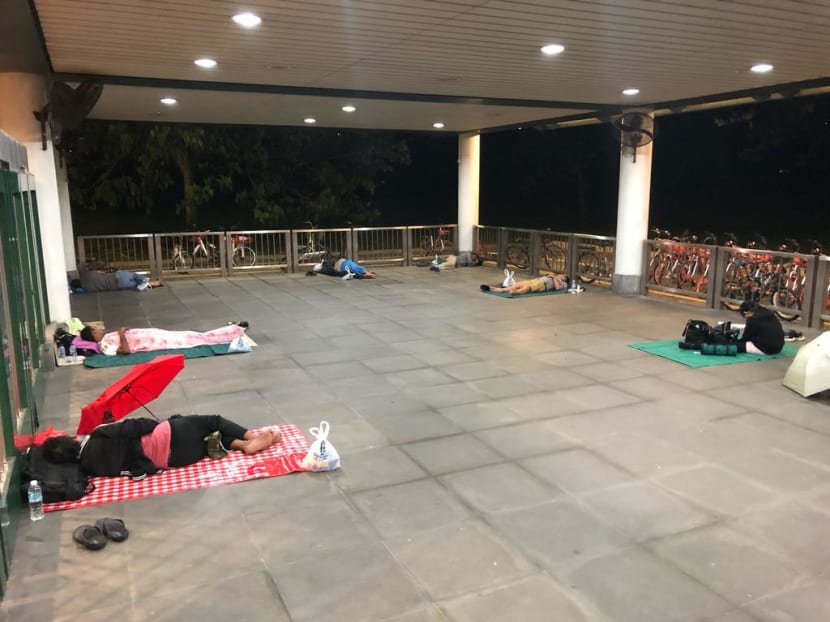Nearly 300 homeless people sought shelter since circuit breaker began: Desmond Lee
SINGAPORE — Nearly 300 homeless individuals have approached the Partners Engaging and Empowering Rough Sleepers (Peers) network to seek shelter since the circuit breaker began on April 7.

Malaysian workers seen sleeping behind the gates of Kranji MRT Station on March 18, 2020. Social and Family Development Minister Desmond Lee said many of the nearly 300 people who had sought shelter were affected by travel restrictions.
SINGAPORE — Nearly 300 homeless individuals have approached the Partners Engaging and Empowering Rough Sleepers (Peers) network to seek shelter since the circuit breaker began on April 7.
In contrast, after the Peers network was launched last July to help homeless people, less than half of the 65 individuals it engaged then were willing to accept help. The network comprises the Social and Family Development Ministry, government agencies and community groups.
Minister for Social and Family Development Desmond Lee provided these statistics in Parliament on Monday (May 4) in response to questions from Member of Parliament (MP) for Ang Mo Kio Group Representation Constituency (GRC) Gan Thiam Poh, Bukit Batok MP Murali Pillai and Nominated MP Anthea Ong.
Mr Lee said that 27 new organisations have stepped up to offer shelter, including the Housing and Development Board (HDB), which has provided vacant rental flats, and religious organisations that have opened their doors.
These shelters — called Safe, Sound Sleeping Places (S3Ps) — can accommodate about 700 rough sleepers. There are about 400 spaces available now.
Many of the nearly 300 people who had sought shelter were affected by travel restrictions, said Mr Lee.
“We have also distributed care packs with hygiene kits and surgical masks to temporary shelter residents, as well as homeless persons in the streets, alongside encouraging them to accept shelter and help,” said Mr Lee.
“Our Peers network has expanded both capacity and operating hours to keep our friends indoors. As much as possible, they have allowed the homeless guests to remain in the S3Ps throughout the day and provided them meals.”
As homeless individuals and rough sleepers are now seeking shelter at places of worship because they are empty during the circuit breaker, MP for Nee Soon GRC Louis Ng asked about MSF’s plans to house this group when these places return to their usual function.
In response, Mr Lee said a number of organisations in the Peers network — both religious and secular — are prepared to provide these spaces beyond the circuit breaker, which is expected to end on June 1.
“We, of course, respect that a number of others may not have the space available after this. Having said that, we continue to establish transitional shelter spaces as well as spaces in S3Ps to support them,” he said.
“The key is to work with them to resolve the underlying social and family and personal circumstances, in order for them to return home, in order for them to find permanency in shelter.”
Some of them are seniors who are unable to return home, especially in the daytime, because of family circumstances or disputes with family members, he added.
Mr Lee said that safe distancing ambassadors have helped to identify those who are out in the open because of underlying issues back home.
Social workers will then work with a network of other partners to try to resolve those issues and find a temporary space that will give them some respite in the meantime.
Mr Lee said that right now, there are about 70 families and 75 individuals in transitional shelters, which provide a safe place for residents.
There are also about 1,900 homeless individuals who may be destitute, as they lack family support and are unable to care for themselves. They are being housed in welfare homes, where care and rehabilitation are provided.








